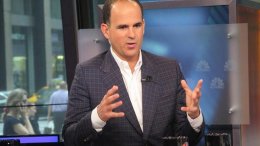
 Melody Hahm | CNBC
Melody Hahm | CNBC
Marcus Lemonis
Whether you are about to launch a start-up or already have an established company, building and maintaining a successful business isn't easy.
Even the most dynamic executives have stumbled and staggered along the way to success.
The Small Business Administration estimates that as of February 2015, there are more than 28 million small businesses currently operational in the United States. Each year, 10 to 12 percent of these businesses close.
Not everyone can be the next Mark Cuban or Mark Zuckerberg, but here are five important lessons from top executives and company founders on how to drive success for your small business.
1. Hire people who are smarter than you.
For an entrepreneur and business owner, one of the most important aspects of your company is your employees. The hiring process, in particular, is the quickest and most effective way to build your business and foster success.
According to Dana Settle, a co-founder and partner of Greycroft Partners, a Los Angeles venture capital firm with $2.6 billion in exits in the past 24 months, even those in leadership positions can't know everything. And that includes the CEO.
"Surround yourself with people who do have experience." Settle said at the iCONIC conference in Los Angeles in June. "You know, hire the best possible people. Hire everybody who you think is smarter than you are in all of the areas that you know the least."
Building a team of people with skills and qualifications that exceed your own can be daunting, but it will ultimately fuel a more creative and innovative workplace.
2. Hang in there.
Bob Parsons, the founder of GoDaddy and a self-made businessman, has made his $2.3 billion fortune on good timing.
For every success that he has seen, there have been infinitely more failures. Parsons' early venture into software programming with a company called Parsons Technology bankrupted him twice. In fact, the entrepreneur admits to almost folding on the company altogether.
"The temptation to quit will be greatest just before you are about to succeed, " said Parsons. "Had I not hung in there, it never would have happened."
Read More10 failed celebrity businesses despite star power
Parsons Technology grew to almost 1, 000 employees and had a 4 percent share of the North American software market, according to Parsons. He sold the business to Intuit for $64 million and used the proceeds to start GoDaddy, a Web-hosting and Internet domain registrar, in 1997.
GoDaddy made $1.4 billion in revenue last year and went public in April of 2015. Stock prices have seen a steady incline since the initial offering of $20 per share. Today the company serves more than 12 million customers and is valued at $4.5 billion.
3. Be vulnerable.
"The Profit's" Marcus Lemonis believes that the key to success is through vulnerability. A leader who is able to establish a relationship and a connection with employees and customers will not only have a more successful business but a more successful and fulfilling life.
"The truth in life is about connecting to people through vulnerability, " Lemonis said at iCONIC LA. "Life is not—and business is not—just about business. It's really about people. It's about establishing relationships."
Read MoreWhy Marcus Lemonis won't take companies public
Lemonis began his session at iCONIC by opening up to the crowd of entrepreneurs about overcoming an eating disorder and suffering molestation by a family member in his childhood, as well as his continued insecurity into adulthood and a fear of dying alone. He added, "I hope you feel a little more connected to me now."
He prompted members of the audience to share their own fears and secrets. Lemonis noted that leaders who are better able to express themselves and have an open dialogue with employees will receive honesty and openness in return.
4. Emotionally charge your brand.
When it comes to storage supplies, Kip Tindell, founder and CEO of the Container Store, has all but cornered the market. For Tindell, the secret to the company's success is creating a brand and products that customers emotionally respond to.
"We are trying to get what we call "the customer dance" one customer at a time ... to where you like your pantry so much that you do a little dance every time you open the door, " Tindell said.
Customers who fall in love with these space-saving storage materials will share that emotion with family and friends, and it will become contagious.
"You can do that with something as pedestrian as a trash can." Tindell said, adding, "That trash can sits in the corner just perfectly; it's the right color, you love the way it's shaped, that pedal opens and closes, and you're kind of proud of your trash can. You know, you are getting emotional there, and that's what we try to do."
For the Container Store, it's not just important to have the right supplies, but to get them at an affordable price and from a staff of excellent workers.
"It's pretty necessary to have a lot of love in your business if you're going to do well. Our customers don't like the Container Store, they love the Container Store. Employees don't like their jobs, they love their jobs."
5. See opportunities, not obstacles.
The Life is Good brand started in 1994 with $78 dollars and 48 T-shirts featuring a stick figure named Jake, and it's grown into an apparel and accessories wholesaler with more than $100 million in sales and merchandise in over 4, 500 stores in 30 countries.
Bert Jacobs, the co-founder of the company and self-proclaimed "chief executive optimist, " took the stage at the iCONIC conference on Tuesday to "spread the good vibes" to an audience of entrepreneurs. Jacobs asked the crowd to try to change their perspective and think about all of the things they "have to do" as things that they "get to do."
Read MoreLife is Good's $100 million ad-free global success story
Life is Good is unique amidst a landscape of businesses focused on quarterly earning and advertising. Jacobs' brand is about providing a product that supersedes materialism and becomes a rallying point for consumers to think more positively, authentically and generously. The company hosts festivals and public events instead of advertising, and 10 percent of all purchases go directly to their nonprofit charity.
"You have a choice every day when you wake up. You have one story. It's called your life, " Jacobs said. "Do we look around in the morning and see obstacles, or do we look around in the morning and see opportunities?"
RELATED VIDEO











